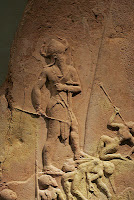Catching up...
I added a bit about The zone to my previous notes on psychogeography; Persephone's domain, the original Plutonium...Though the zone is a psychogeographical term and designates many kinds of zones, it is a term from standard geography texts. The psychogeographer is interested in the feel of a place, the numinous and the irrational, hence the zone being the zone of alienation, the 'Plutonium' zone of Chernobyl and Fukushima. It is more than a description of spirit.
The name of the God who seizes Persephone is Hades, from a Greek word meaning invisible. Radiation, invisible, powerful.
His other name is Pluto -wealth- 'lots of cheap energy'.
But the realm is the land of the dead.
And a reactor gone wrong is a very expensive business indeed.
Plutonium should be renamed, phishonium to designate the false economy of believing spin!
The rings of The Sanctuary in particular, and Woodhenge too, have their links with death. The tomb of Tutankhamen and the Sutton Hoo burial fixed wealth and death together in the 1920's. Digging up burial sites in the hope of loot may not have been Maud Cunnington's dream, but finds like the golden mug found in the Rillaton Barrow kept people digging until laws were passed.
More fascinating for me is the British preoccupation with the other world, parallel universes and how easily a slip between worlds may occur.
But for me, what next?
Finishing off maps I guess, trying to make sense of the original -believed in- geography of the world.
One subject that hadn't occurred to me before is the effect of the Reformation on thought.
Marlowe's play Dr Faustus occurs at an interesting time, it is on the border between the old world of the Renaissance, and the new world of the Reformation. Dr Faust is a Renaissance man: he puts knowledge above all things, he doubts the bible. Marlowe points out that Faust is ripe for Lucifer's attentions, but he makes his audience see that they too could have made the same mistake as Faust.
The Reformation far from saving *us* from corrupt priests and bad religion was a hideous 'back to basics regime' that gave The Puritans the right to enforce their version of reality on the bewildered and religious.
Iconoclasm isn't always a good thing. Destruction of other people's dreams in the name of progress and in the name of saving their souls is to say the least, a depressing side effect of new movements! The energy comes from tensions already present in society, but the symbols and narratives become all pervading. It generally causes civil wars, witch hunts..and worse
I was reading Plutarch's (AD 120) meandering thoughts about the many theories of his time concerning why the moon appears to have a face (De Sera). The theories are many, they are contradictory and fascinating. He describes the earth taking the body, and the moon taking the mind, leaving the soul free to return to earth as a helpful spirit.
And what I hadn't seen before is that maybe the freedom to think this way was curtailed by the tyranny of pure religion (the Reformation with its imperative to get away from anything 'Popish').
Plutarch's book isn't 'truth-seeking', it is instead a springboard for new ideas, nowhere in it is there any warning that something may not be correct.
There is plenty of space for new ideas.
On the other hand the Reformation was rather good for science.
As Francis Bacon once put it: "There are two books laid before us to study; to prevent us falling into error; first, the volume of the Scriptures which reveal the will of God; then the volume of the Creatures, which express His power."
Kepler likewise wanted truth: "Truth in religion is based on the Word of God in Scripture, while truth in natural science is based on evidence and reason."
The more peculiar theories about reality were swept away by the sensibleness of rational thought and the limits being rational, demands. On the other hand, no one told Newton that seeing seven colours (because of the seven planets) was being silly!
Well we are told that empirical truth (don't think about indigo) is always a good thing, and that truth is a matter of fact and that the imagination is best reserved for art. Perhaps some people still maintain that a divide between science and art is necessary, another eternal truth...though in this day and age less people still believe that.
Once again, due to TV and the Internet, we, like Plutarch live in a kaleidoscopic world of many theories and many more possibilities.
Yet the Reformation habit of denigrating the less rational worlds and portraying them as a domain of devils (blood chilling videogames creating murderous children, dangerous strangers lurking at the edges of the Net), This fear of the otherworld, the ephemeral, the virtual, remains in our culture -in its present form- from the Reformation...
The name of the God who seizes Persephone is Hades, from a Greek word meaning invisible. Radiation, invisible, powerful.
His other name is Pluto -wealth- 'lots of cheap energy'.
But the realm is the land of the dead.
And a reactor gone wrong is a very expensive business indeed.
Plutonium should be renamed, phishonium to designate the false economy of believing spin!
The rings of The Sanctuary in particular, and Woodhenge too, have their links with death. The tomb of Tutankhamen and the Sutton Hoo burial fixed wealth and death together in the 1920's. Digging up burial sites in the hope of loot may not have been Maud Cunnington's dream, but finds like the golden mug found in the Rillaton Barrow kept people digging until laws were passed.
More fascinating for me is the British preoccupation with the other world, parallel universes and how easily a slip between worlds may occur.
But for me, what next?
Finishing off maps I guess, trying to make sense of the original -believed in- geography of the world.
One subject that hadn't occurred to me before is the effect of the Reformation on thought.
Marlowe's play Dr Faustus occurs at an interesting time, it is on the border between the old world of the Renaissance, and the new world of the Reformation. Dr Faust is a Renaissance man: he puts knowledge above all things, he doubts the bible. Marlowe points out that Faust is ripe for Lucifer's attentions, but he makes his audience see that they too could have made the same mistake as Faust.
The Reformation far from saving *us* from corrupt priests and bad religion was a hideous 'back to basics regime' that gave The Puritans the right to enforce their version of reality on the bewildered and religious.
Iconoclasm isn't always a good thing. Destruction of other people's dreams in the name of progress and in the name of saving their souls is to say the least, a depressing side effect of new movements! The energy comes from tensions already present in society, but the symbols and narratives become all pervading. It generally causes civil wars, witch hunts..and worse
I was reading Plutarch's (AD 120) meandering thoughts about the many theories of his time concerning why the moon appears to have a face (De Sera). The theories are many, they are contradictory and fascinating. He describes the earth taking the body, and the moon taking the mind, leaving the soul free to return to earth as a helpful spirit.
And what I hadn't seen before is that maybe the freedom to think this way was curtailed by the tyranny of pure religion (the Reformation with its imperative to get away from anything 'Popish').
Plutarch's book isn't 'truth-seeking', it is instead a springboard for new ideas, nowhere in it is there any warning that something may not be correct.
There is plenty of space for new ideas.
On the other hand the Reformation was rather good for science.
As Francis Bacon once put it: "There are two books laid before us to study; to prevent us falling into error; first, the volume of the Scriptures which reveal the will of God; then the volume of the Creatures, which express His power."
Kepler likewise wanted truth: "Truth in religion is based on the Word of God in Scripture, while truth in natural science is based on evidence and reason."
The more peculiar theories about reality were swept away by the sensibleness of rational thought and the limits being rational, demands. On the other hand, no one told Newton that seeing seven colours (because of the seven planets) was being silly!
Well we are told that empirical truth (don't think about indigo) is always a good thing, and that truth is a matter of fact and that the imagination is best reserved for art. Perhaps some people still maintain that a divide between science and art is necessary, another eternal truth...though in this day and age less people still believe that.
Once again, due to TV and the Internet, we, like Plutarch live in a kaleidoscopic world of many theories and many more possibilities.
Yet the Reformation habit of denigrating the less rational worlds and portraying them as a domain of devils (blood chilling videogames creating murderous children, dangerous strangers lurking at the edges of the Net), This fear of the otherworld, the ephemeral, the virtual, remains in our culture -in its present form- from the Reformation...

